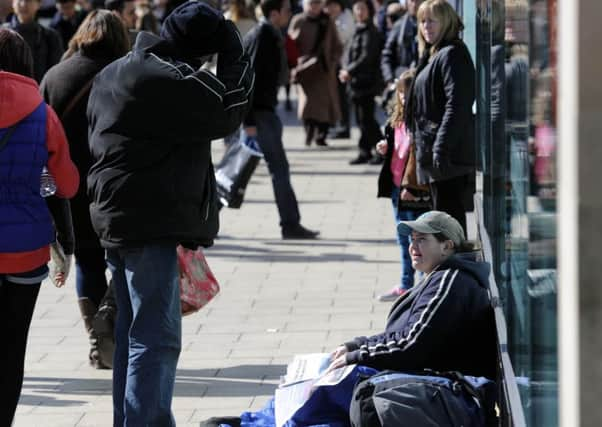Study shines light on hardship faced by people begging in Edinburgh


The study said at least 420 people had been begging in the Capital over the two years to October 2018.
And it found that the lives of those begging were characterised by deep, often lifelong poverty, poor mental and physical health, addiction and the constant threat of abuse.
Advertisement
Hide AdAdvertisement
Hide AdThe report said there was “no quick fix” for the deep-rooted problems faced by those who were begging.
But it urged more proactive support and increased training for staff to help people move on from begging and said services should be flexible to cope with those who have complex needs.
The study was commissioned by the Edinburgh Community Safety Partnership, which brings together the city council, health board, police and others. Shelter said it was the first detailed piece of research into begging in any UK city for 20 years.
Partnership chair Councillor Amy McNeese-Mechan said: “This is the first step in producing a long-term strategy to fully understand and respond to the complexities of street begging. We’ve set up a working group to analyse the findings and develop an action plan.”
Advertisement
Hide AdAdvertisement
Hide AdThe study found 78 per cent of those begging in Edinburgh were male, most people were aged between 30 and 49 and 89 per cent were UK nationals. It also found 73 per cent had a local connection with their accommodation or last settled address being in Edinburgh.
The research found people used the money made from begging for food, heating and accommodation. And while some said they begged to feed addiction they also resorted to begging for things like children’s clothing.
Shelter said the findings did not support the idea that those begging were making large amounts of money to support a high standard of living but rather showed most were barely sustaining themselves.
Almost three-quarters had experienced some form of physical or verbal abuse or theft on the streets, some from other people begging and some from the general public.
Advertisement
Hide AdAdvertisement
Hide AdMore than 80 per cent said they had mental health issues including anxiety, depression and Post Traumatic Stress Disorder; more than 62 per cent had physical health problems; and more than half suffered from both. Almost 80 per cent said they were taking either drugs, alcohol or both. Half were in treatment.
Fiona King, national campaigns and policy manager for Shelter Scotland, said: “Behind these statistics are real people who have often survived significant trauma and hardship and they need a compassionate response. Most of them are suffering from ill-health often including addictions.
“What gives us room for optimism is the evidence that support services, especially those with kind, empathetic staff and volunteers, offer people the best chance to move on from begging.”